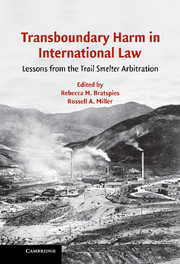Book contents
- Frontmatter
- Contents
- Contributors
- Acknowledgments
- Foreword by David D. Caron
- TRANSBOUNDARY HARM IN INTERNATIONAL LAW
- Introduction
- PART ONE THE TRAIL SMELTER ARBITRATION – HISTORY, LEGACY, AND REVIVAL
- PART TWO TRAIL SMELTER AND CONTEMPORARY TRANSBOUNDARY HARM – THE ENVIRONMENT
- 11 Trail Smelter in Contemporary International Environmental Law: Its Relevance in the Nuclear Energy Context
- 12 Through the Looking Glass: Sustainable Development and Other Emerging Concepts of International Environmental Law in the Gabčikovo-Nagymaros Case and the Trail Smelter Arbitration
- 13 Trail Smelter's (Semi) Precautionary Legacy
- 14 Surprising Parallels between Trail Smelter and the Global Climate Change Regime
- 15 Sovereignty's Continuing Importance: Traces of Trail Smelter in the International Law Governing Hazardous Waste Transport
- 16 The Legacy of Trail Smelter in the Field of Transboundary Air Pollution
- 17 The Impact of the Trail Smelter Arbitration on the Law of the Sea
- PART THREE TRAIL SMELTER AND CONTEMPORARY TRANSBOUNDARY HARM – BEYOND THE ENVIRONMENT
- Annex A Convention Between the United States of America and the Dominion of Canada Relative to the Establishment of a Tribunal to Decide Questions of Indemnity and Future Regime Arising from the Operation of Smelter at Trail, British Columbia
- Annex B Trail Smelter Arbitral Tribunal Decision, April 16, 1938
- Annex C Trail Smelter Arbitral Tribunal March 11, 1941, Decision
- Index
14 - Surprising Parallels between Trail Smelter and the Global Climate Change Regime
Published online by Cambridge University Press: 08 September 2009
- Frontmatter
- Contents
- Contributors
- Acknowledgments
- Foreword by David D. Caron
- TRANSBOUNDARY HARM IN INTERNATIONAL LAW
- Introduction
- PART ONE THE TRAIL SMELTER ARBITRATION – HISTORY, LEGACY, AND REVIVAL
- PART TWO TRAIL SMELTER AND CONTEMPORARY TRANSBOUNDARY HARM – THE ENVIRONMENT
- 11 Trail Smelter in Contemporary International Environmental Law: Its Relevance in the Nuclear Energy Context
- 12 Through the Looking Glass: Sustainable Development and Other Emerging Concepts of International Environmental Law in the Gabčikovo-Nagymaros Case and the Trail Smelter Arbitration
- 13 Trail Smelter's (Semi) Precautionary Legacy
- 14 Surprising Parallels between Trail Smelter and the Global Climate Change Regime
- 15 Sovereignty's Continuing Importance: Traces of Trail Smelter in the International Law Governing Hazardous Waste Transport
- 16 The Legacy of Trail Smelter in the Field of Transboundary Air Pollution
- 17 The Impact of the Trail Smelter Arbitration on the Law of the Sea
- PART THREE TRAIL SMELTER AND CONTEMPORARY TRANSBOUNDARY HARM – BEYOND THE ENVIRONMENT
- Annex A Convention Between the United States of America and the Dominion of Canada Relative to the Establishment of a Tribunal to Decide Questions of Indemnity and Future Regime Arising from the Operation of Smelter at Trail, British Columbia
- Annex B Trail Smelter Arbitral Tribunal Decision, April 16, 1938
- Annex C Trail Smelter Arbitral Tribunal March 11, 1941, Decision
- Index
Summary
INTRODUCTION
The substantive principles of international law for which the Trail Smelter arbitration has come to serve as shorthand are widely viewed as the foundation stones on which all international environmental law is constructed. Such expansive, almost mythological claims for the Trail Smelter case have, in due course, invited severe criticism. Still, the Trail Smelter principles persist in international instruments, casebooks, and scholarly footnotes, as the “locus classicus” of international environmental law. So it is not at all surprising that one need only scratch the surface to find trace elements of these Trail Smelter principles in the global climate change regime, where they make their most conspicuous appearance in the preamble to the United Nations Framework Convention on Climate Change (UNFCCC).
Critics challenging the doctrinal significance of the Trail Smelter arbitration rightly warn against making too much of such manifestations of the Trail Smelter principles. Indeed, Trail probably had very little influence on the substantive norms forming the global climate change regime. But, as John Wirth noted in Smelter Smoke in North America, the Trail Smelter arbitration is about much more than the heavily debated principles of limited territorial sovereignty and polluter liability. “The main issues of the case,” Wirth complained, “have been otherwise ignored or obscured by the conventional wisdom about Trail's [doctrinal] significance.” Several facets of the Trail Smelter arbitration, beyond the eponymous principles, suggest surprising and important links between Trail, the global climate change regime, and international environmental law in general.
- Type
- Chapter
- Information
- Transboundary Harm in International LawLessons from the Trail Smelter Arbitration, pp. 167 - 180Publisher: Cambridge University PressPrint publication year: 2006
- 1
- Cited by



